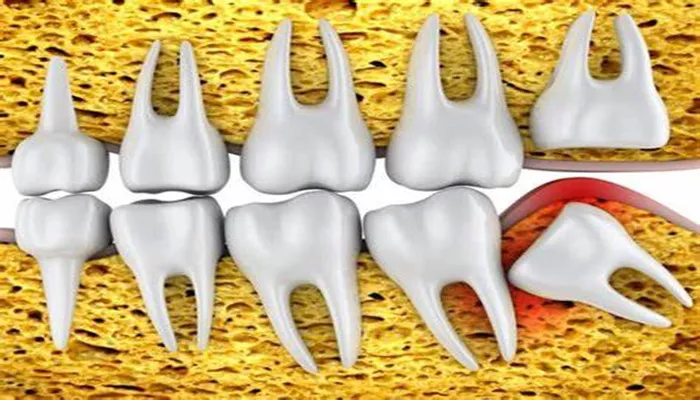Wisdom teeth removal is a common dental procedure many people undergo in their late teens or early twenties. Despite being routine, the recovery process can vary significantly from person to person.
Experiencing pain after wisdom teeth removal is normal, but it can sometimes extend longer than expected, raising concerns and questions. In this article, we’ll explore the reasons why your mouth might still hurt after wisdom teeth removal, what to expect during the recovery process, and how to manage and alleviate the discomfort.
Normal Healing Process And Expected Pain
Immediate Post-Operative Pain
Pain immediately after wisdom teeth extraction is common and usually managed with prescribed painkillers. The intensity of pain can vary depending on several factors, including the complexity of the extraction and your pain tolerance. Typically, pain peaks within the first 24 to 48 hours after surgery.
Swelling and Bruising
Swelling and bruising are part of the normal healing process. Swelling often peaks around the second or third day post-surgery and can contribute to discomfort. Bruising can appear on the cheeks and jaw and may take a few days to become visible, adding to the pain perception.
SEE ALSO: 5 Reasons Why Wisdom Teeth Hurt More at Night
Initial Healing Phase
During the first week, you may experience soreness and tenderness in the surgical area. The gums and surrounding tissues are healing, and the formation of a blood clot in the extraction site is crucial for proper recovery. Disturbance of this clot can lead to complications such as dry socket, which we’ll discuss later.
Reasons for Prolonged Pain
1. Dry Socket
One of the most common causes of prolonged pain after wisdom teeth removal is dry socket. This occurs when the blood clot that forms in the socket is dislodged or dissolves before the wound heals. Without this protective layer, the bone and nerves are exposed to air, food, and fluids, causing severe pain.
Symptoms of Dry Socket
Severe pain within a few days after surgery
Pain that radiates to the ear, eye, temple, or neck
An empty-looking socket where the blood clot should be
Unpleasant taste or odor in the mouth
Treatment for Dry Socket
If you suspect dry socket, it’s essential to contact your dentist or oral surgeon immediately. Treatment usually involves cleaning the socket and placing a medicated dressing to promote healing and reduce pain.
2. Infection
Infections can occur after any surgical procedure, including tooth extractions. Signs of infection include persistent pain, swelling, redness, and discharge from the extraction site. Fever and swollen lymph nodes may also indicate an infection.
Prevention and Treatment of Infection
Antibiotics: Your dentist may prescribe antibiotics to prevent or treat an infection.
Oral Hygiene: Keeping the extraction site clean by following your dentist’s instructions is crucial.
Follow-Up Visits: Attend all scheduled follow-up appointments to monitor healing.
Impacted or Misaligned Teeth
If other teeth are impacted or misaligned, they can cause additional discomfort after the extraction. This pain can sometimes be mistaken for post-extraction pain.
3. Nerve Damage
In rare cases, the removal of wisdom teeth can cause nerve damage, leading to prolonged pain. This is more common when the lower wisdom teeth are close to the mandibular nerve.
Symptoms of Nerve Damage
Numbness or tingling in the tongue, lips, or chin
Persistent pain in the jaw
Difficulty in speaking or eating
Bone and Tissue Trauma
The process of extracting wisdom teeth can cause trauma to the surrounding bone and tissue. This trauma can result in prolonged pain as the tissues and bone heal.
4. Sinus Issues
For upper wisdom teeth, the roots can be close to the sinus cavity. Occasionally, the extraction can create an opening between the mouth and sinus, leading to pain and sinus issues.
Managing And Alleviating Post-Extraction Pain
Pain Medication
Over-the-counter pain relievers like ibuprofen or acetaminophen are usually sufficient to manage post-extraction pain. For more severe pain, your dentist may prescribe stronger painkillers.
Ice Packs
Applying ice packs to the outside of your face can help reduce swelling and numb the area, providing relief from pain.
Rest and Elevation
Resting with your head elevated can help reduce swelling and discomfort. Avoid strenuous activities for a few days after the surgery.
Salt Water Rinses
Gently rinsing your mouth with warm salt water can help keep the extraction site clean and reduce inflammation.
Soft Diet
Eating soft foods like yogurt, mashed potatoes, and smoothies can prevent irritation of the extraction site. Avoid hot, spicy, and hard foods that can disturb the healing process.
Hydration
Staying hydrated is essential for overall healing. Drink plenty of water but avoid using straws, as the suction can dislodge the blood clot.
When to Contact Your Dentist
It’s important to know when to seek professional help. Contact your dentist if you experience:
Severe pain that doesn’t improve with medication
Persistent swelling or redness
Fever or chills
Pus or discharge from the extraction site
Difficulty swallowing or breathing
Long-Term Outlook
Most people recover from wisdom teeth removal without significant issues. However, it’s essential to follow your dentist’s post-operative care instructions and attend all follow-up appointments to ensure proper healing.
Healing Time
Complete healing of the extraction site can take several weeks to a few months. The initial pain and swelling usually subside within a week or two, but it’s normal to experience minor discomfort for a more extended period.
Preventive Care
Maintaining good oral hygiene and regular dental check-ups can help prevent complications after wisdom teeth removal and promote overall dental health.
Conclusion
Experiencing pain after wisdom teeth removal is a normal part of the healing process, but prolonged or severe pain can indicate complications such as dry socket, infection, or nerve damage. Understanding the reasons behind the pain and knowing how to manage it effectively can help you recover more comfortably. Always follow your dentist’s instructions and seek professional help if you experience any concerning symptoms. With proper care, you can ensure a smooth recovery and return to normal activities in no time.

